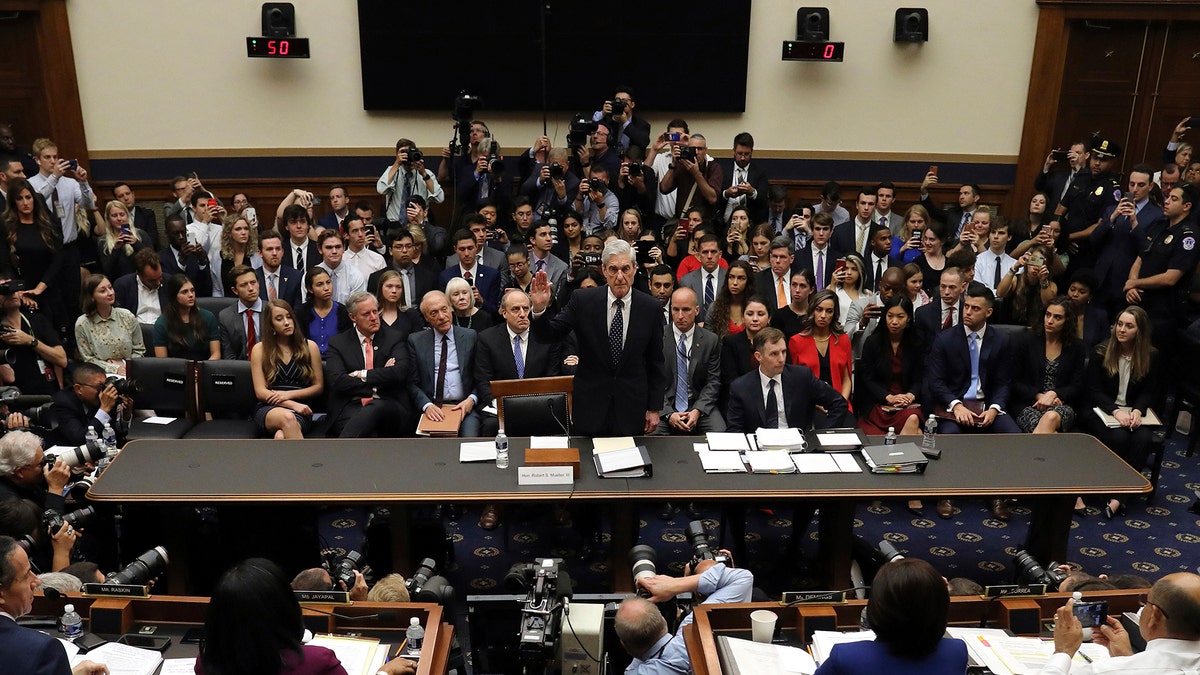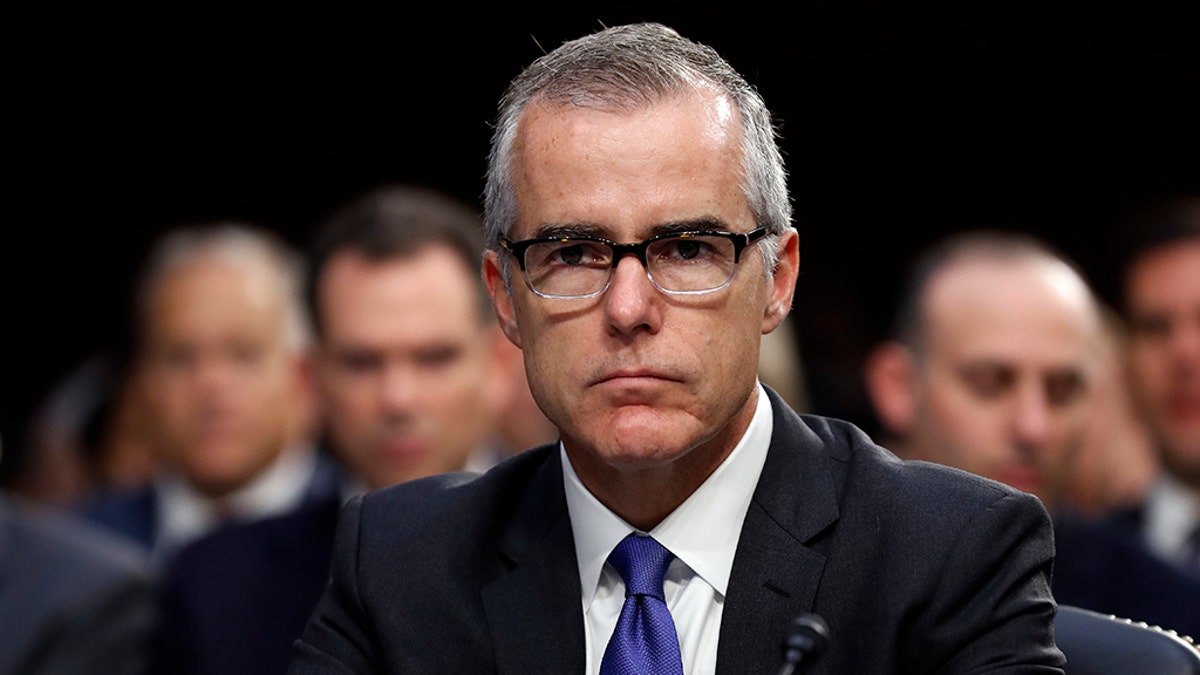K.T. McFarland on Flynn takedown: 'It wasn't just one or two bad apples'
K.T. McFarland tells Brian Kilmeade it was more than just Peter Strzok who was involved in taking down General Flynn. 'It had to be multi-agency,' McFarland says.
Brandon Van Grack, a top Justice Department prosecutor and former member of Special Counsel Robert Mueller's team, is no longer handling the case of former national security adviser Michael Flynn, it emerged Thursday afternoon.
Just minutes after that news surfaced, Justice Department sources told Fox News that the DOJ was dropping the Flynn case entirely. That move came on the recommendation of U.S. Attorney Jeff Jensen, who served as an FBI agent for more than a decade and had been evaluating the Flynn case.
Van Grack is also withdrawing from other unrelated cases as well, raising questions about his future at the DOJ. No explanation was given for Van Grack's abrupt withdrawal from the Flynn case, which was recorded in a brief filing with the court on Thursday. An administration official tells Fox News that Van Grack is still at DOJ and has not resigned.
But Van Grack's removal from the cases came just days after Fox News reported that explosive, newly unsealed evidence documenting the FBI's efforts to target Flynn -- including a top official's handwritten memo debating whether the FBI's "goal" was "to get him to lie, so we can prosecute him or get him fired" -- called into question whether Van Grack complied with a court order to produce favorable evidence to Flynn.
Since February 2018, Van Grack -- who now heads the DOJ's Foreign Agents Registration Act (FARA) unit -- has been obligated to comply with D.C. District Court Judge Emmet G. Sullivan's standing order in the Flynn case to produce all evidence in the government’s possession “that is favorable to defendant and material either to defendant’s guilt or punishment.”
The order also requires the government to submit favorable defense evidence to the court, including possible "impeachment evidence" that could undermine witnesses, even if the government believes the evidence “not to be material.” (Sullivan still has the ultimate authority over what to do with Flynn's case, even after the DOJ withdrawal, given that a guilty plea has been entered.)
Van Grack has long informed Sullivan that the government’s so-called "Brady" obligations, referring to prosecutors' duty to turn over exculpatory materials to defendants, have been met. In an October 2019 filing, Van Grack denied governmental misconduct and assured the court that the government “has complied, and will continue to comply, with its discovery and disclosure obligations, including those imposed pursuant to Brady and the Court’s Standing Order.”
In that same October 2019 motion, Van Grack elaborated on those claims, telling Sullivan that the government had not “affirmatively suppressed evidence” or hid Brady material. He denied that the government was “aware of any information that would be favorable and material to [Flynn] at sentencing.”
WHO IS JOE PIENTKA, MYSTERY FBI AGENT AT CENTER OF FLYNN AND CARTER PAGE CASES? ... FBI SCRUBS HIM FROM WEBSITE
Van Grack further dismissed arguments by Flynn's attorney, Sidney Powell, that “General Flynn was targeted and taken out of the Trump administration for concocted and political purposes” as “conspiracy theories.”
What Van Grack didn’t inform the court about – and didn’t provide to Flynn – was the newly unsealed January 4, 2017 "Closing Communication" from the FBI Washington Field Office, which recommended the FBI close its investigation of Flynn, as its exhaustive search through government databases “did not yield any information on which to predicate further investigative efforts."

FILE - In this Dec. 1, 2017, file photo, Michael Flynn, center, arrives at federal court in Washington. A judge set a sentencing hearing for Michael Flynn after rejecting arguments from the former Trump administration national security adviser that prosecutors had withheld evidence favorable to his case. (AP Photo/Susan Walsh, File)
BOMBSHELL FBI MATERIALS REVEAL FBI DISCUSSED INTERVIEWING FLYNN TO GET HIM TO LIE, GET HIM FIRED
Van Grack also failed to provide evidence to Flynn’s attorneys that anti-Trump former FBI agent Peter Strzok then immediately intervened and instructed the FBI case manager handling the Flynn investigation to keep the probe open, followed by indicators that the bureau would seek to investigate Flynn for possible violations of an obscure 18th century law known as the Logan Act -- which has never been utilized in a modern prosecution.
Another Strzok text mentions that the FBI’s "7th floor" – meaning FBI leadership – may have been involved in the decision to keep the Flynn case alive.
Instead, Van Grack characterized Flynn’s alleged false statements as critical to the FBI’s “legitimate and significant investigation into whether individuals associated with the campaign of then-candidate Donald J. Trump were coordinating with the Russian government in its activities to interfere with the 2016 presidential election.”
He argued to Sullivan that Flynn’s “conduct and communications with Russia went to the heart of that inquiry.” And Van Grack said that Flynn’s alleged “false statements to the FBI on January 24, 2017, were absolutely material.”
But by that time, the FBI had already cleared Flynn of any improper ties, coordination, or communication with Russia. Just a day before Flynn's January 2017 White House interview, the Washington Post ran a story declaring that the FBI "had reviewed Flynn’s calls with Russian ambassador but found nothing illicit," citing unnamed "U.S. officials."

Former special counsel Robert Mueller is sworn in before testifying to the House Judiciary Committee about his report on Russian interference in the 2016 presidential election on Capitol Hill on Wednesday, July 24, 2019, in Washington. (Chip Somodevilla/Pool Photo via AP)
Shedding light on internal FBI deliberations, notes from the then-assistant director of the FBI’s Counterintelligence Division Bill Priestap -- written before the Flynn interview and after discussions with then-FBI Director James Comey and then-FBI Deputy Director Andrew McCabe, Fox News is told -- show discussions of whether their “goal” at the White House interview was “to get him to lie, so we can prosecute him or get him fired.”
HOROWITZ REPORT MAY INADVERTENTLY REVEAL PIENTKA'S ROLE IN PAGE, FLYNN MATTERS
These unsealed notes further suggest that agents planned in the alternative to get Flynn “to admit to breaking the Logan Act” when he spoke to then-Russian Ambassador Sergey Kislyak during the presidential transition period.
The Logan Act has never been used in a modern criminal prosecution and has a questionable constitutional status; it was enacted in 1799 in an era before telephones and was intended to prevent individuals from falsely claiming to represent the United States government abroad.
"Any criminal investigation grounded in Logan Act questions is an obvious political pretext to attack the Trump Administration," GOP Reps. Jim Jordan and Mike Johnson wrote to FBI Director Christopher Wray on Monday, in a letter seeking in-person interviews and key documents. "FBI attorney Lisa Page admitted to Congress the Justice Department saw the Logan Act as an 'untested' and 'very, very old' statute."

FILE - In this June 7, 2017 file photo, acting FBI Director Andrew McCabe appears before a Senate Intelligence Committee hearing about the Foreign Intelligence Surveillance Act on Capitol Hill in Washington. Attorney General Jeff Sessions said Friday, March 16, 2018, that he has fired former FBI Deputy Director McCabe, a longtime and frequent target of President Donald Trump's anger, just two days before his scheduled retirement date. (AP Photo/Alex Brandon, File)
This new evidence puts Van Grack at risk for accusations that he was misleading Sullivan as to the materiality of Flynn’s statements to FBI agents Strzok and Joe Pientka when they interviewed him in the White House on January 24, 2017.
DOJ regulations first spotted by the Twitter user Techno Fog state that prosecutors like Van Grack, "with limited exceptions ... should be granted access [by FBI agents] to the substantive case file and any other file or document" that they "have reason to believe may contain discoverable information related to the matter being prosecuted." The regulations state that prosecutors can "personally review the file or documents or may choose to request production of potentially discoverable materials from the case agents."
Van Grack's withdrawal means he won't appear at the next hearing in the case -- unless Sullivan decides to order him to appear to explain himself.
READ JORDAN AND JOHNSON'S LETTER TO THE FBI
Flynn earlier this year moved to withdraw his guilty plea for making false statements to the FBI regarding his communications with Russia's ambassador. His legal team, at the time, said that the move was “because of the government’s bad faith, vindictiveness and breach of the plea agreement.”
On Thursday, the DOJ concluded that Flynn's calls with the ambassador "were entirely appropriate on their face."
In December 2017, and on the brink of financial ruin, Flynn was forced to put his home in Old Town Alexandria, Va.—located just outside Washington D.C.—on the market with an asking price of $895,000 to pay his mounting legal bills.
According to Zillow, the townhouse sold for $819,995 in September 2018. Powell confirmed the sale of the house to Fox News. That financial pressure, coupled with the FBI's failure to turn over exculpatory evidence, may have contributed to his guilty plea.
Flynn was accused of giving equivocal and evasive answers to FBI agents in the White House, but no transcript of the conversation exists. Instead, after-the-fact FBI notes of the interview with Strzok and Pientka were the primary evidence -- even though the notes indicated that Strzok and Pientka didn't think Flynn was lying. Strzok was later removed from Mueller's team when his anti-Trump text messages surfaced.
Transcripts did exist, however, showing Flynn's conversations with Russia's ambassador. The FBI freely and publicly admitted to reviewing those transcripts and clearing Flynn of any wrongdoing, prior to the White House interview.
Fox News' Jake Gibson and Wilson Miller contributed to this report.





